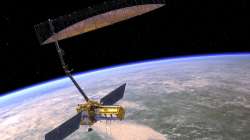ISRO-NASA satellite NISAR scheduled to be launched by 2022
The NASA-ISRO Synthetic Aperture Radar (NISAR) satellite is expected to be launched by 2022, according to a joint statement issued after a strategic dialogue between India and the US on Tuesday.

The NASA-ISRO Synthetic Aperture Radar (NISAR) satellite is expected to be launched by 2022, according to a joint statement issued after a strategic dialogue between India and the US on Tuesday. India and the US have also decided to share Space Situational Awareness information, which will catalyse efforts to create the conditions for a safe and sustainable space environment, it said.
The two sides also expressed the intent to continue the India-US Space Dialogue as well as discussions on areas of potential space defense cooperation.
The joint statement, issued after the 2+2 strategic dialogue between Defence Minister Rajnath Singh, External Affairs Minister S Jaishankar and their US counterparts Secretary of States Michael R Pompeo and Secretary of Defense Mark T Esper, said, "the ministers applauded the ongoing collaboration between Indian Space Research Organisation (ISRO) and National Aeronautics and Space Administration, including on the NASA-ISRO Synthetic Aperture Radar (NISAR) satellite scheduled to be launched by 2022."
The space agencies of the two countries had signed an agreement in 2014 to conduct the joint NISAR mission to co-develop and launch a dual-frequency synthetic aperture radar on an Earth observation satellite.
"The ministers also looked forward to sharing Space Situational Awareness information, which will catalyse efforts to create the conditions for a safe, stable, and sustainable space environment," it said.
Space debris, which is tens of thousands currently in the Earth's orbit, pose a threat to space assets.
Space Situational Awareness (SSA) refers to keeping track of objects in orbit and predicting where they will be at any given time.
Last year, the ISRO laid the foundation stone for its own Space Situational Awareness Control Centre.
The ministers welcomed the signing of a Memorandum of Understanding (MoU) for Technical Cooperation in Earth Observation and Earth Sciences between the Ministry of Earth Sciences and the US National Oceanic and Atmospheric Administration, the joint statement said.
The signing of MoU will be for developing a better understanding of the regional and global weather origins in the Indian Ocean and advancing common research goals in meteorology, oceanography, and management of living marine resources, it said.
